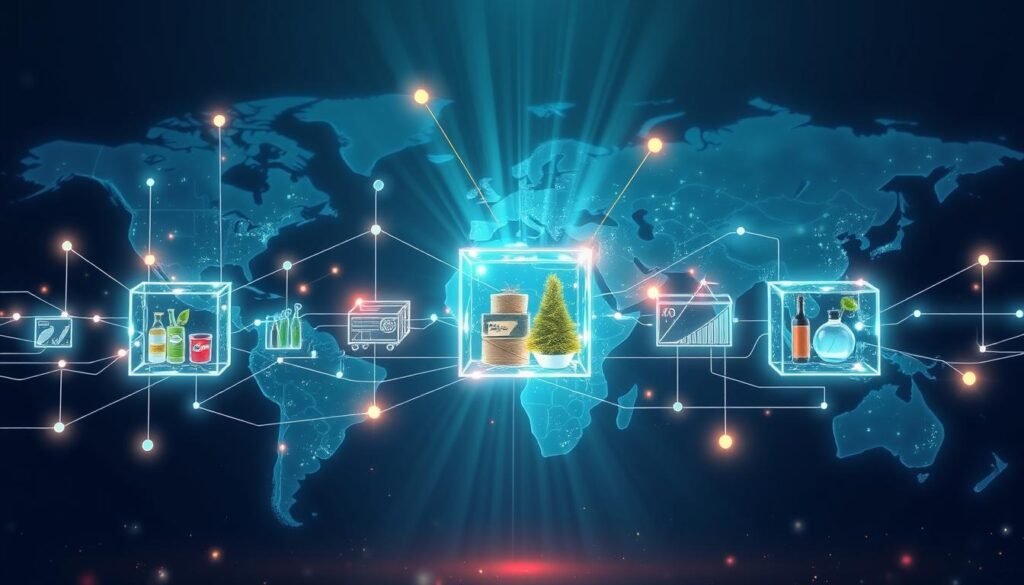Did you know traditional money transfers across countries can be expensive? Fees can reach up to 20% of the transferred amount. Blockchain technology offers a cheaper solution. It has the potential to drastically cut these costs. This could change our financial world. Blockchain isn’t just about Bitcoin or other digital currencies. It’s a special technology that makes transactions secure and clear without needing a central system. This tech works across many fields.
Blockchain’s true power comes from its ability to work without a central authority. This isn’t just more secure, but it also has many uses beyond digital money. Experts believe it will soon be everywhere. They see it solving hard problems in areas like supply chains and identity checks. It might also change how contracts work through smart contracts. This new tech could remove the need for middlemen in business. It also keeps data safe and can make many processes work by themselves.
Key Takeaways
- Blockchain technology dramatically reduces the costs of cross-border payments compared to traditional methods.
- Decentralized systems facilitate secure and transparent transactions without central authority reliance.
- Smart contracts within blockchain can automate and secure agreements, representing a technological leap in contract management.
- Blockchain enhances security for identity management through independent validation processes.
- The diverse applications of blockchain extend far beyond cryptocurrencies, impacting multiple sectors daily.
Introduction to Blockchain Technology
Blockchain technology is changing the game in many fields. It creates a new way to handle trusted transactions. At its heart, it’s a system where no single person or group has control. Transactions are recorded in a way that nobody can change them. This is done using complex math to keep everything secure.
What is Blockchain?
Think of blockchain as a digital record book that’s not kept in one place. Instead, its pages (or “blocks” of transactions) are kept on many computers. These computers are linked in a chain. Every deal is checked with digital signatures, making fraud nearly impossible. The use of advanced math makes sure that once something is recorded, it can’t be changed. This builds trust and openness.
History and Evolution
Blockchain started making waves with Bitcoin in 2009. But now, it’s not just about digital money. By 2020, the Bitcoin ledger was huge, showing its growing popularity. There’s been a shift to private blockchains for business. This change has sparked many new uses. Events like the Ethereum split in 2016 show how blockchain keeps evolving. It proves blockchain’s power to adapt and grow.
Decentralization and Security
One key feature of blockchain is it doesn’t have a central control point. This spread-out system makes it very secure. There’s no one spot hackers can attack to bring everything down. Also, it cuts out the need for middlemen. Blockchain’s security is tight, using tough protocols and math. Many industries, from finance to shipping, are now using blockchain. They value its promise for secure, honest deals.
Blockchain in Financial Services
Blockchain technology is changing how we deal with money. It brings secure and efficient ways to process transactions and payments. Thanks to cryptocurrency, the financial world is about to see a big change.
Cryptocurrencies
Cryptocurrencies such as Bitcoin and Ethereum are powered by blockchain. They make transactions safe and don’t need middlemen. This makes sending money faster and cheaper. Ethereum, for example, proves to save a lot more than old technologies.
In 2018, 91% of banks were putting money into blockchain. A big number of them, 66%, plan to use it widely soon. This shows that many see blockchain as a better way to handle payments.
Cross-Border Payments
Sending money abroad has been hard. It’s slow, expensive, and tangled in rules. Blockchain makes it easier and cheaper. A study by Jupiter Research says it could save banks up to $27 billion by 2030 on international payments.
Usually, sending $200 across borders costs about 6.94% in fees. This takes away $48 billion from remittances each year. Blockchain can cut these costs a lot. It decreases risks, speeds up the process, and makes it more efficient.
With 73% of central bank survey respondents requiring retail CBDCs to be available under all circumstances and for all types of payments, blockchain’s role is set to be pivotal in ensuring the resilience and security of future financial systems.
Blockchain greatly improves cryptocurrency and international payments. As more financial groups use it, we’ll see faster, cheaper, and safer financial services.
Blockchain’s Role in Supply Chain Management
Blockchain technology is becoming key in making supply chains clear and efficient. It lets companies track every part and process from start to finish. This greatly improves how well we can trace the supply chain.
Enhanced Tracking and Transparency
Blockchain greatly improves supply chain transparency. All transactions are securely recorded, making it easy to spot and fix any issues quickly. Since data on the blockchain can’t be changed unfairly, security and trust go up. A report says the market for blockchain in supply chain management could hit USD 17.15 billion by 2030. This shows a lot of people are interested in using blockchain in different fields.
Blockchain can also automate tracking inventory, cutting down on costs and making the supply chain more efficient. This leads to quicker, cheaper delivery. It improves customer satisfaction because they can see where products come from. This builds trust in the brand.
Case Study: Toyota’s Recall
In 2009, Toyota had to recall many vehicles because of a problem with gas pedals. If they had used blockchain, they could have dealt with the recall better. Blockchain would have let Toyota quickly find and deal with the cars that had issues. This could have saved a lot of money and kept their reputation stronger.

Blockchain can track every step in making a product, from getting the parts to putting them together. This not just speeds up fixing problems but also helps the environment. It does this by tracking carbon emissions all through the supply chain.
Using blockchain for checking quality means every product has to meet set standards. This is checked with reliable data at each step. This cuts down the chance of fraud. It also makes working together easier for buyers, suppliers, and banks in the supply chain. Now, as seven big companies in the U.S. look into using blockchain, it’s set to change industry practices and keep supply chains up to date.
Smart Contracts and Their Applications
Smart contracts are changing various sectors like finance, supply chains, and real estate. They use blockchain tech to make transactions automatic and secure. These contracts work on their own, following “if/when… then…” rules set in the blockchain.
Automating Agreements
Smart contracts automate agreements and remove intermediaries. This makes things faster, more efficient, and accurate. For example, we.trade, backed by IBM Blockchain, quickens international trade. It cuts down friction and lowers risk.
In supply chains, Sonoco and IBM use blockchain to monitor temperature-sensitive medicines. This boosts open and trusted relationships among parties involved. The Home Depot uses smart contracts to better communicate within its supply chain. This speeds up vendor disputes and strengthens business ties.
The DAO Incident
The DAO incident was a key event for smart contracts. It highlighted their risks. In 2016, someone took advantage of a flaw in DAO’s smart contract. This led to a loss of over $50 million in Ether. It showed the importance of careful code checks and tests to avoid such issues. Yet, smart contracts are still a reliable way to manage agreements. The DAO event led to more talks on improving safety and management in blockchain systems.
Potential and Limitations
Smart contracts can be used in many fields, bringing benefits like speed and cost savings. They’re good for real estate deals, stock trade, loans, and more. Nick Szabo came up with smart contracts in 1994. Since then, the idea has grown a lot. Szabo saw them as digital ways to do contracts.
Still, smart contracts have their problems. Once made, you can’t change them. This is hard if there are code errors. They depend largely on the skill of the programmers. It’s vital to know the strengths and limits of smart contracts. This knowledge is key in law and business with blockchain.
Blockchain in Identity Management
Blockchain technology is changing how we handle digital identity. It makes identity verification secure and efficient. Because it’s decentralized, blockchain lowers the risk of identity theft and data breaches found in traditional methods.
Enhancing Online Security
Blockchain greatly improves online security. Traditional systems can be hacked at a single point, which blockchain avoids. It speeds up and secures identity checks at a lower cost. This tech also protects your personal info, crucial since 97% of breaches in 2018 targeted such data. The decentralized nature of blockchain spreads out identity data, making it safer.
Applications in Voting and Real Estate
Blockchain also changes voting and property record management. It keeps voter registration secure and transparent, cutting down electoral fraud. In 2021, the biggest identity theft was in government benefits, showing the need for better security in voting. Blockchain ensures safe and correct property records, too. This is especially important in real estate for maintaining trustworthy property records.
| Benefit | Details |
|---|---|
| Faster Verification | Blockchain automates processes, significantly reducing time. |
| Reduced Costs | Lower expenses related to identity verification and data management. |
| Enhanced Security | Decentralization minimizes risks of data breaches and fraud. |
| Transparency | Public blockchains ensure transparency and trust through openness. |
| Data Control | Users maintain control over their digital identities, limiting misuse. |
Blockchain has a big role in improving digital identity management. It deals with important issues like security, efficiency, and openness. This tech provides strong solutions for verifying identities, enhancing online safety, and managing voting and property records. It’s setting the stage for a safer and more reliable digital world.
Blockchain in the Automotive Industry
Blockchain technology is changing the automotive industry. It’s making vehicle production and data security in racing better. The market for automotive blockchain is growing quickly. It promises to improve production efficiency and the management of supply chains.
Improving Production Efficiency
Blockchain is getting used in making cars to make things run smoother and more efficiently. It offers a clear and unchangeable record for tracking parts. This helps reduce delays and fight fraud.
BMW uses blockchain to follow the origin of parts and make their supply chain better. Toyota works with tech giants like MIT and BigchainDB to improve auto insurance processes with blockchain.
Blockchain is key in fighting fake car parts. In 2017, over 500,000 fake car parts, valued at $4 million, were seized in Abu Dhabi. Blockchain helps verify and track parts. This is crucial for companies like Nissan, which loses about $60 million each year to fake parts in the Arab Emirates.

The Future of Blockchain in Automotive
The outlook for blockchain in cars is bright, with big investments ahead. By 2025, the car industry might spend $169 billion on new technologies. Roughly 0.6% of this will go into blockchain. This shows how much the industry believes in blockchain.
Blockchain will not just make production better. It will also improve compliance and data security in racing. Blockchain can make compliance happen automatically with smart contracts. This keeps records clear and unchangeable. In racing, it helps make sure data is fair by stopping tampering.
Blockchain will also speed up the use of autonomous electric cars. It offers a secure way for these cars to share data. This is needed for them to work safely and efficiently.
Automotive leaders like Daimler and Ford are exploring blockchain. Daimler is storing car history with blockchain to better their services. Ford is looking into using blockchain for easy payments between cars and smart devices.
Blockchain is already changing the car industry today. It’s not just a future idea. It boosts production, secures supply chains, and makes sure compliance is met. This includes the important area of racing data security.
Blockchain in Education
Blockchain technology is changing the education world. It makes student records safer, improves learning platforms, and makes checking credentials easier. These changes are making things better for both students and teachers.
Managing Student Records
Using blockchain in education is changing the way student records are kept. Old systems often had mistakes and were open to fraud. But, with education blockchain, schools can keep student data safe and unchangeable. This lets students easily get their records and share them with employers. It cuts down on the need for deep background checks.
Decentralized Learning Platforms
Decentralized learning platforms using blockchain let people everywhere take courses. They also let teachers make and share their own content directly. This setup makes sure that the educational content and degrees are real and trustworthy. It uses a secure ledger that can’t be changed. Blockchain also allows for creating secure digital diplomas, leading to a more trusted school setting.
Verification of Academic Credentials
Blockchain makes checking academic backgrounds easier by using a secure system. This lowers the amount of work needed to organize courses and records. For example, it helps fight the problem of fake degrees by keeping certificates secure and unchangeable. This means their validity is sure.
Initiatives like the Education Blockchain Initiative (EBI) and the Blockchain Innovation Challenge (BIC) are looking into how blockchain can help people and improve job chances in education. The BIC gave $900,000 to projects that aim to build educational systems with blockchain. These projects focus on building community, working together, and understanding data better.
Challenges and Risks of Blockchain Implementation
Blockchain holds great promise, but several challenges block its widespread use. It’s vital for companies to know these issues if they’re thinking about this tech.
Adoption and Integration Costs
The main hurdle is the high integration costs. Switching to new systems can be pricey. It may require updates to both hardware and software. Also, finding and hiring the right people adds to the expense.
A 2020 survey showed 49% see a skills gap as a big problem. Blockchain is complex and requires experts for setup and maintenance. This makes starting and keeping the system going costly.
Maintaining Data Privacy
When adding blockchain, keeping data privacy is a top worry. Its natural openness can clash with the need for privacy. This is especially true in health and finance.
Gartner reports that only 12% were using blockchain solutions, moving cautiously because of privacy issues. Matching blockchain’s open nature with strict privacy laws is tough due to its decentralized setup.
The Need for Consistent Updates
Keeping blockchain systems up-to-date is tough. They need regular updates to stay safe and effective. Gartner thinks 46% will use blockchain by 2025, showing how important updates are.
But, updating can take a lot of resources and mess up current systems. Because blockchain is decentralized, making updates uniform is hard. This makes staying consistent a challenge.
These tech hurdles highlight why good planning and resource use are key for companies wanting to use this game-changing tech.
| Challenges | Impacts |
|---|---|
| High Integration Costs | Financial strain due to setup, development, and skilled personnel employment |
| Data Privacy | Balancing transparency with privacy regulations, especially in sensitive industries |
| Update Consistency | Resource-intensive updates and potential disruption of workflows |
Conclusion
Blockchain changes how businesses work, notably in finance, healthcare, supply chains, and government. Created by Satoshi Nakamoto in 2008, it offers a secure way to make transactions without a middleman. Its emphasis on trust and transparency has ushered in a digital revolution.
Industries are already seeing the benefits of blockchain. For example, IBM discovered that many government bodies plan to use it for various tasks. Estonia has successfully used blockchain to improve its public services. Gartner believes that by 2022, companies using blockchain could be worth $10 billion. They predict the technology will generate over $3.1 trillion in business value by 2030.
Yet, blockchain is not without its problems. It faces issues with growing effectively, legal obstacles, and environmental impacts. To progress, it must continue to evolve and address these challenges. According to PwC, blockchain’s secure records, cost savings, and fraud prevention make it key for the future. As it evolves, blockchain will lead to a digital world that’s more secure, efficient, and open.
















